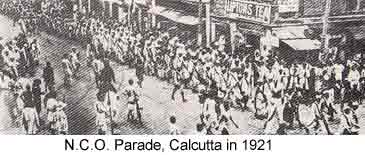

 |  |
 C.R. Das was among the first to be arrested, followed by his wife Basantidebi, whose arrest so incensed the youth of Bengal that thousands came forward to court arrest. In the next two months, over 30,000 people were arrested from all over the country, and soon only Gandhiji out of the top leadership remained out of jail. Gandhiji had been under considerable pressure from the Congress rank and file as well as the leadership to start the phase of mass civil disobedience. Gandhiji announced that mass civil disobedience would begin in Bardoli taluqa of Surat district, and that all other parts of the country should cooperate by maintaining total discipline. But Bardoli was destined to wait for another six years. Its fate was decided by the action of members of the Congress and Khilafat procession in Chauri Chaura in Gorakhpur district of U.P. on 5 February 1922. Irritated by the behaviour of some policemen, a section of the crowd attacked them. The police opened fire. At this, the entire procession attacked the police and when the latter hid inside the police station, set fire to the building. Policemen who tried to escape were hacked to pieces and thrown into fire. In all twenty-two policemen were done to death. On hearing of the incident, Gandhiji decided to withdraw the movement. He also persuaded the Congress Working Committee to ratify his decision. The nation was shocked at this decision, but on 12th February 1922, the non-cooperation movement came to an end. next page >> |
Copyright ©2000 indiansaga.info. All rights reserved.
By using this service, you accept that you won't copy or use the data given in this website for any commercial purpose.
The material on indiansaga.info is for informational & educational purpose only.
This site is best viewed at 800 X 600 picture resolution.